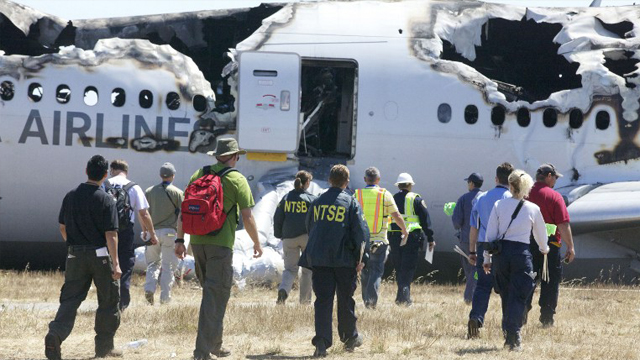SUMMARY
This is AI generated summarization, which may have errors. For context, always refer to the full article.

MANILA, Philippines – The Philippine aviation regulators decided to focus on airline safety before pursuing further commercial agreements with South Korea, the country’s top source of tourists.
The Philippine aviation officials decided to put on hold the long-delayed air talks with South Korea after an aircraft of Asiana Airlines crashed at the San Francisco International Airport on July 6.
Fresh from the success of being taken out of the European Union aviation safety blacklist, the head of the Civil Aviation Authority of the Philippines (CAAP) said they decided not to immediately restart bilateral air negotiations with Korea.
“We are evaluating ourselves whether Asiana is a safe airline. We have standards, too,” CAAP director general William Hotchkiss told reporters on Wednesday, July 10.
He said the CAAP is currently on a wait-and-see mode as they await the official investigation results of the National Transportation Safety Board (NTSB) of the United States regarding the San Francisco crash that killed two and injured over 180 passengers.
Overseeing the implementation by local airlines of the global safety standards was a key reasons why the Philippines has been added to the EU’s blacklist, which put the Philippines in the same category as Swaziland, Botswana, and other smaller countries.
The EU ended its 3-year ban on Philippine carriers that want to fly into the air space of the 28-member bloc following the March announcement of the International Civil Aviation Organizations (ICAO) that the Philippines has met the global safety aviation standards that the UN body has set.
The lifting of the ban by the EU was one of the conditions Korea has set before restarting talks to increase flights between various airports in Korea and its neighbor, the Philippines.
AirPhil Express (now PAL Express) earlier expressed interest in mounting flights between Manila and Incheon, but the government of South Korea denied its application. Korea cited the EU ban, as well as the Category 2 rating by the US Federal Aviation Administration and the safety concerns raised by ICAO.
“We were talking about how to restart our the air talks,” Hotchkiss said, referring to a recent chat with his Korean counterpart. “He was very optimistic about it.”
The San Francisco crash changed the Philippine’s position. “We are putting on hold the talks in the meantime,” he said.
The South Korea-based carrier flies to the Philippines through hubs in Manila, Clark and Cebu, helping bring in over one million, or about one-fourth, of the over 4.27 million tourists that visited the Philippines in 2012.
Increasing bilateral air rights is one of the moves the Philippine government is pursuing to meet its goal of 6 million tourist arrivals by 2016. – Rappler.com
Add a comment
How does this make you feel?
There are no comments yet. Add your comment to start the conversation.